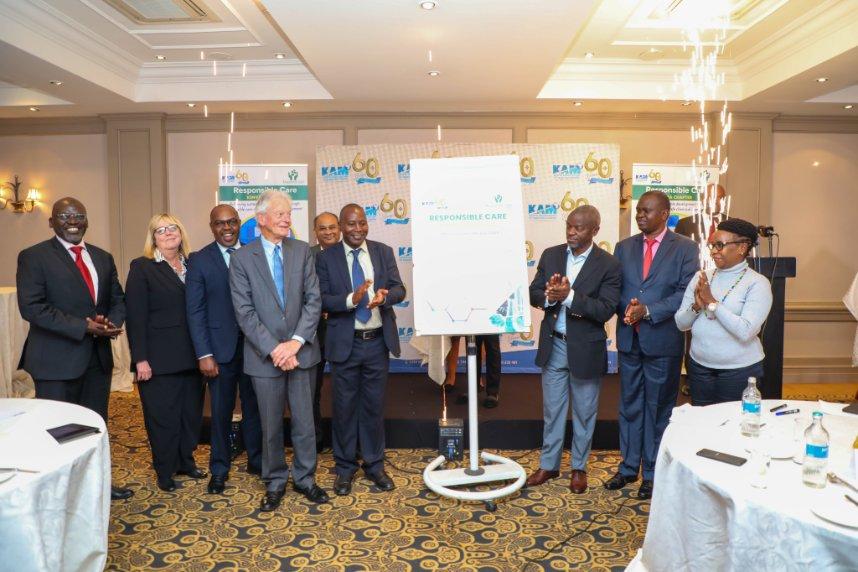- Seven Responsible Care Codes will serve as the framework for the project by Kenyan manufacturers.
- The codes are community awareness and emergency response; employee health and safety; product stewardship; process safety; pollution prevention; distribution; and security.
- Industry lobby KAM says the new strategy will support competitiveness on a worldwide scale.
Industry lobby the Kenya Association of Manufacturers (KAM) has committed members to promote the safe use of chemicals throughout the manufacturing lifecycle.
The move follow’s a pledge this week by KAM members to continuously improve the manner in which they handle chemicals. The lobby said the commitment will be under a new campaign dubbed the Responsible Care Initiative – Kenya Chapter.
KAM Chief Operating Officer Tobias Alando said through the Chapter, KAM member companies will run open and transparent reporting on how they handle chemicals as per the Responsible Care guiding principles.
“Our mission is to promote and facilitate safe chemicals management. Kenya is fourth in Africa to be accredited in 2021,” Alando said.
Developing strategic communications
The initiative is guided by seven Responsible Care Codes. These are community awareness and emergency response; employee health and safety; product stewardship; process safety; pollution prevention; distribution; and security.
According to Alando, the Chapter will increase its capacity, welcome new members, and create a strategic plan.
Anthony Mwangi, CEO of KAM, claims that the measure will promote industry competitiveness on a global basis. This will be done by making sure that participants exercise the proper caution when manufacturing, delivering, and using chemicals. He went on to remark that the program not only promotes moral behavior but also increases businesses’ ability to compete.
Contribution to GDP
At the moment, KAM has 1,300 active members in 41 counties and 14 industries. According to Mwangi, the sector contributes 7.8% of Kenya’s GDP and aims to reach 20% by 2030. He disclosed that KAM had paid $2.59 billion in taxes as of late.
Responsible Care is a voluntary movement by associations and industries. According to KAM, the goal is to handle chemicals in a way that promotes safety, health, the environment. Additionally, the code will ensure security throughout the life cycle of chemicals.
International Council of Chemical Associations Board Member Barry Dyer said: “Responsible Care is an ongoing commitment to improving the safety, health, and environmental performance of chemical companies and their products throughout their entire life cycle.”
NEMA oversight
David Ong’are, Director of Enforcement and Compliance at the National Environment Management Authority (NEMA), stated that the organization has made efforts to provide resources and processes to help implement Responsible Care activities.
The authority has a draft toxic and hazardous chemicals and materials management regulations, noted Onga’re.
By using and valuing responsible care, according to senior assistant secretary for the ministry of the environment Rodney Omari, “we are certain that we shall increase consumers’ confidence in Kenyan products, thus increasing our global competitiveness and exports by expanding and creating a new market for Kenyan Products.”
Mr Omari added that the government has enacted the Sustainable Waste Management Act 2022. Through this law, the government seeks to transform Kenya from a linear to a circular economy.
“Subsequently, we shall enhance safety, promote efficiency, stimulate innovation, spur recycling and reduce waste.”
Omari said Responsible Care Initiative is crucial even as the country develops to be a middle-income country.
“To ensure the effective implementation of Responsible Care initiatives, it’s crucial to establish plans that ensure everyone possesses the fundamental knowledge required for proper care and handling of chemical waste,” Omari said.
National Disaster Management Unit Director Dr Duncan Ochieng’ said the initiative stems from a strong belief in the importance of promoting resilience in the community. “We recognize that fostering resilience is crucial for the overall sustainability and progress of Kenya,” he explained.
Manoj Shah, the chair of the KAM Chemical and Allied Sector, stated that waste and byproducts are a constant in industry.
Conventions on harmful and dangerous chemicals
To add on, embracing responsible care principles will minimize waste and promote sustainable practices. There are a number of conventions on harmful and dangerous chemicals.
Globally, there have been concerns about the dumping of industrialized nations’ toxic waste in developing nations. In order to tackle the challenge, nations adopted the Basel Convention on the Control of Transboundary Movements of Hazardous Wastes and their Dumping in 1989.
In 1998, the Prior Informed Consent Procedure for Certain Hazardous Chemicals and Pesticides in International Trade (Rotterdam Convention) was ratified.
The urgent need for international action to safeguard the environment and human health from such pollutants led to the adoption of the Stockholm Convention on Persistent Organic Pollutants in 2001.
